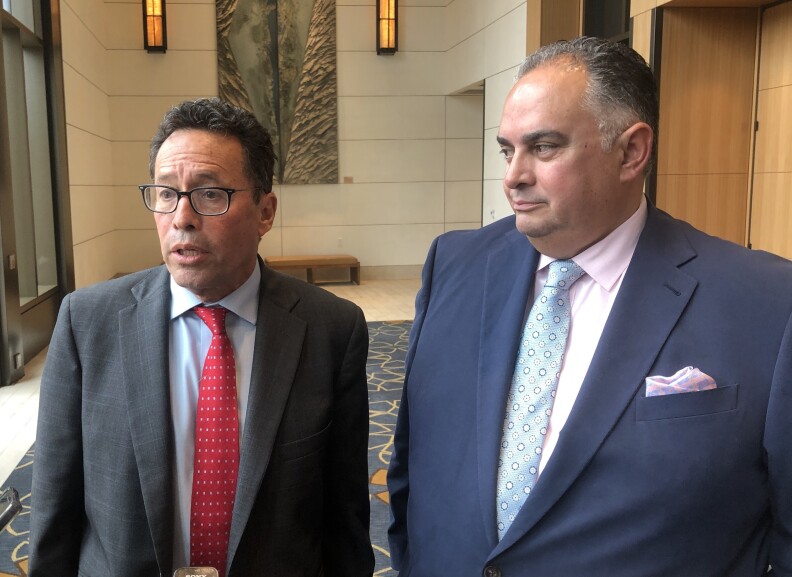State policymakers and the leaders of the state’s marquee public university system have each expressed support in recent months for opening campus jobs to students who are undocumented.
But conflict over how to create such a policy — and not end up in a legal battle with the federal government — has set the stage for a power struggle.
It started when the University of California regents approved a groundbreaking proposal nearly a year ago to open campus jobs to their undocumented students. Then, in January, they voted against opening those jobs.
Why did it happen this way?
UC President Michael Drake "basically put the fear of God in everybody in saying that we were going to get sued, we were going to lose all this money,” UC Regent Jose Hernandez told LAist.
California has more than 80,000 students who are undocumented, and campus jobs can help them pay for college. In the absence of action by UC, state legislators have stepped in and introduced measures to revive the policy.
The background
Almost three years ago, undocumented students from various UC campuses created a group called the Undocumented Student-Led Network. They worked with UCLA's Center for Immigration Law and Policy to form the Opportunity For All campaign, centered on an untested legal argument for opening up campus jobs to undocumented students.
The argument for the policy change: In the 1986 Immigration Reform and Control Act, the federal government prohibited hiring people who are undocumented. But because that law only specifies the federal government and private employers, the thinking goes, it does not bind state governments from acting — and therefore a state employer, like the University of California.
In the months since their campaign started, advocates have seen highs and lows in their efforts, culminating in the decision this past January to pause implementation of such a policy.
“When the regents voted unanimously back in May of 2023, I didn't really see there being a pathway for them to veer off of that promise,” said Jeffry Umaña Muñoz, a UCLA student and co-chair of the Undocumented Student-Led Network.
While the University of California has otherwise supported undocumented students with legal counseling, tailored academic support, and financial assistance, the about-face has led state lawmakers to take action.
The argument for
A year ago, UC Regent John Pérez was visibly one of the strongest supporters of the jobs policy on the policymaking body. Former governor Jerry Brown appointed him a UC Regent in 2014 and his fellow regents appointed him chair of the body five years later.

Pérez had risen from L.A.-area labor union politics to the state assembly, then to assembly speaker in 2010. He appeared to bring all those skills to bear to pass the policy.
Pérez could not be reached for comment for this story.
A regents working group began to meet in the summer to talk through what changes needed to be made in UC’s bureaucracy to open the jobs. But in the following months, concerns about the policy’s political and legal fallout began to emerge from Drake’s office.
“[Lawyers] in the Office of President would tell us that what we wanted to do in terms of implementing the policy was illegal,” Hernandez, the regent, said.
Legal scholars across the country, meanwhile, had said the policy was legally sound.
Hernandez said UC lawyers warned that, “the federal government was going to come down hard on the campus and there was risk of losing federal grants for breaking the law.”
The argument against
Jeffry Umaña Muñoz, the UCLA student, said that in an October 2023 meeting with four other student organizers, UC’s student regent, and UC’s general counsel, Drake said he would focus on implementing the policy.
“At the end of the day, we felt President Drake walked back on his promise to us,” Umaña Muñoz said.
[W]e have concluded that the proposed legal pathway is not viable at this time, and in fact carries significant risk for the institution and for those we serve.
When asked for a response to the criticism, a spokesperson for Drake pointed to comments Drake made in January, that if the federal government says UC is violating the law:
- Human resources and legal professionals could be prosecuted.
- UC would be subject to civil fines and criminal penalties.
- UC could lose access to federal contractors.
- Existing contracts and grants could be jeopardized.
Those comments do not say that Drake had told students he would implement the policy. The statement lists ways UC has supported students who are undocumented.
“[W]e have concluded that the proposed legal pathway is not viable at this time, and in fact carries significant risk for the institution and for those we serve,” Drake said earlier this year, adding that he wanted to work with UC Regents, students, and advocates to find ways to help students who are undocumented “in a way that does not expose individuals or the University to unnecessary risk.”
Actions on the table
In February, Assemblymember Sabrina Cervantes introduced a state constitutional amendment, ACA 20, to compel UC campuses to create these jobs for students who are undocumented.
And earlier this month, Assemblymember David Alvarez introduced AB 2586 to open these jobs on UC campuses, as well as the 23 campuses of the California State University system and over 100 California community colleges.
The university reiterated its concerns in an April 3 letter to the Assembly Higher Education Committee Chair Mike Fong. It was signed by Drake’s legislative director, Mario Guerrero, who framed the January decision as a pause "until next year while we continue to examine ways to expand undocumented students’ access to equitable educational experiences."
What might be different next year: Hernandez said Drake’s office didn’t want to expose UC to the wrath of possible anti-immigrant backlash if Donald Trump was re-elected president in November.
Why California's position matters
No other public university system in the country has opened up campus jobs to students who are undocumented.
-
Members of the public can address UC regents either by phone or in-person during open sessions of their meetings. There are guidelines (such as: you get up to three minutes). Sign-ups for public comment open 10 days before a board meeting.
-
You can also email the regents once an agenda is posted, at regentsoffice@ucop.edu. Emails received at least two days before a board meeting starts are distributed to the regents for review.
“California has been on the cutting edge of immigration policy nationally,” said UCLA labor studies and ethnic studies professor Kent Wong.
By way of example, Wong pointed to Proposition 187, which eliminated public benefits for residents who were undocumented. It was ruled unconstitutional. On the other end of that political spectrum, Wong said, is AB 540. That’s the bill that became California law in 2001 and allowed residents who are undocumented to pay in-state tuition at California public universities.
“I am the son of two immigrants who came to this country undocumented,” said South San Diego County Assemblymember David Alvarez.
By opening job opportunities on campus to students who are undocumented, Alvarez said, the students would have the work and educational opportunities of all other students. And using state law would help.
“From what I’ve read and what they’ve shared with me is that it would be very difficult for the federal government to go after individuals who are following a state mandate," Alvarez said. "If we approve [AB 2586] it would be a state mandate."







